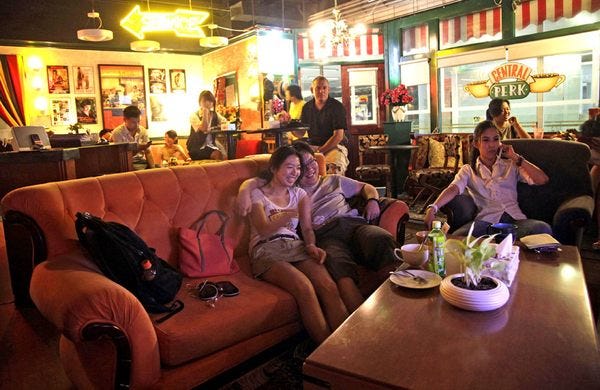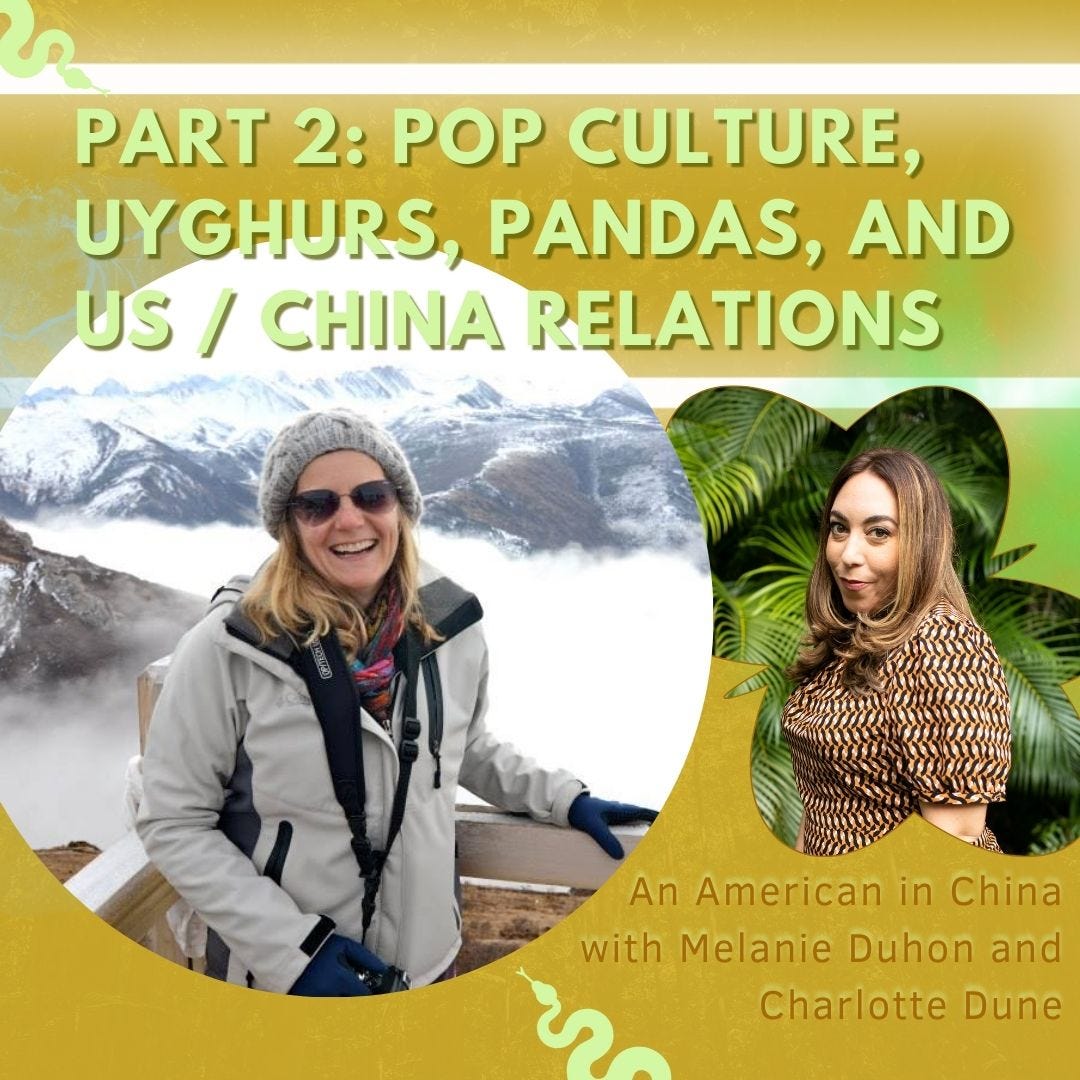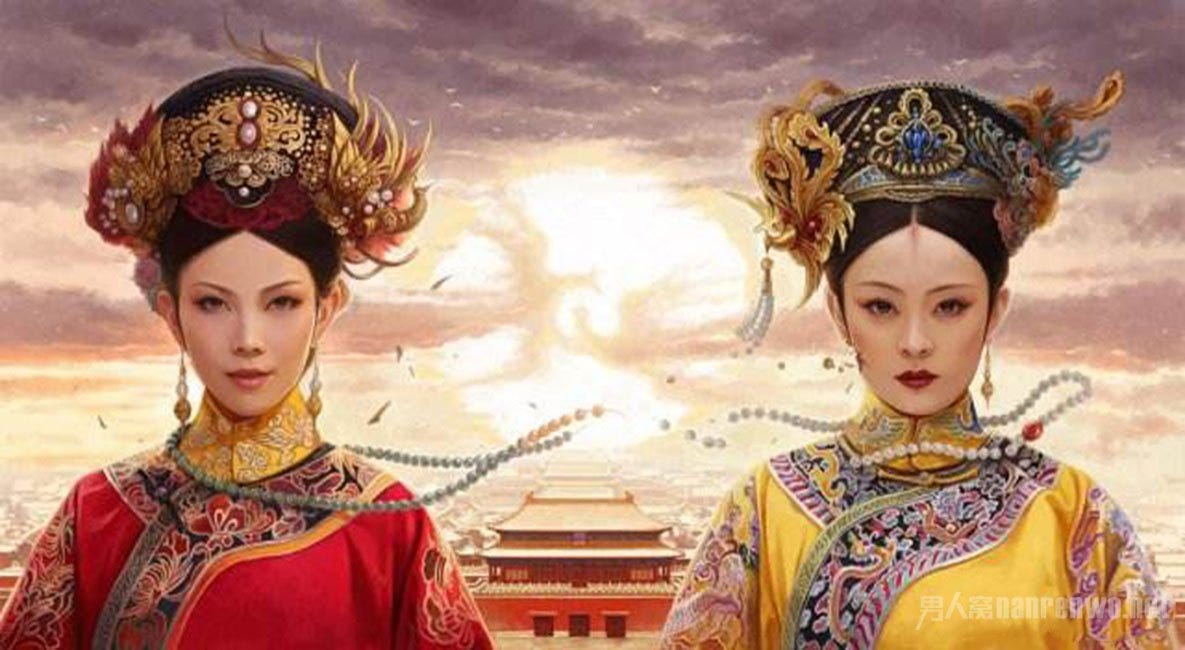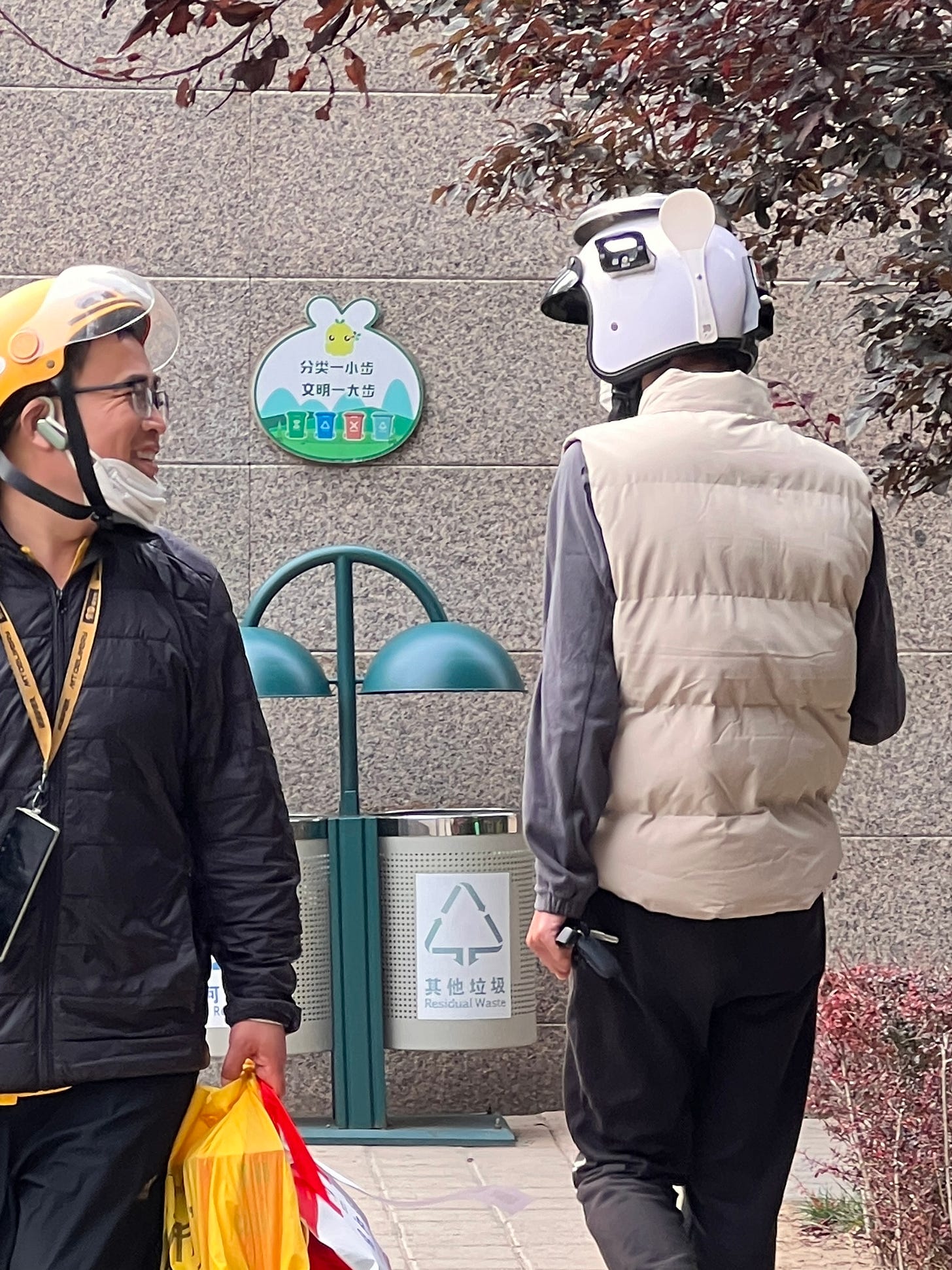Part 2: An American Expat in China with Melanie Duhon
Beijing pop culture, individuality, food, minority villages, Uyghurs, and more
This is part two of my interview with Melanie Duhon, an American who spent many years living in Beijing.
In Part 1 we discussed:
The Beijing Lifestyle
The pandemic experience in China
The surveillance state
In this part of the interview, we talk about:
Pop culture crossovers
The Uyghurs
Being “minded”
Nightlife and regional travel
Racism in China
Individual Expression vs the Collective
U.S. / China Relations and more
*I’ve edited and arranged this interview for readability.
Listen to the entire, unedited interview here.
A note from me:
I don’t support genocide of any kind. I guess this needs to be said.
Feel free to share any knowledge or opinions on this interview in the comment section.
Let’s get into it.
Part 2: An American Expat in China with Melanie Duhon
Pop Culture?
Charlotte: Americans don't watch Chinese television, but do Chinese people watch a lot of American television?
Melanie:
Chinese people don't have access to American news channels. If they do manage to access American news, certain parts are censored or bleeped out, as deemed inappropriate for the Chinese public. In general, most Chinese people don't have exposure to American TV shows unless they use a VPN to explore other options, which some people do.
There's not much exchange in terms of American TV shows either. However, Chinese people do enjoy shows like "Friends." There used to be a coffee shop in China that replicated the set of "Friends," and all the waitresses were named Rachel, which was quite amusing.

Three-Body Obsession
Charlotte: Recently, I watched a Chinese TV show called Three-Body. It was the first Chinese TV show I've seen, based on the popular Three-Body Problem book, which I love. The production company put it on Youtube with English subtitles, otherwise, I wouldn’t have been able to watch it.
Korean shows are quite popular on Netflix, especially among the younger generation, like my daughter, who is 15, and watches a lot of K-dramas. However, I don't think many Americans have ever watched a Chinese TV show. I believe it would be beneficial for both cultures to have more exchange in terms of pop culture.
Melanie:
While "The Three-Body Problem" has gained popularity in the US, other Chinese shows might be perceived as cheesy and maybe wouldn’t resonate with American audiences. Chinese people sometimes watch soap operas set in Imperial times, like "Empresses in the Palace" and the Chinese watch big Marvel movies and some Hollywood blockbusters, but Chinese TV shows often have a different style that Americans might find over-the-top. The taste in shows is different between the two cultures as far as I can tell. However, I may be mistaken. Chinese people should correct me if I'm wrong.
Charlotte: I was really impressed with The Three-Body Problem series. The production quality was excellent. One particular scene [in episode #29] stood out to me as one of the craziest scenes I've ever seen in anything I've ever watched. It was quite remarkable.
Though I posted about watching Three-Body on my Instagram and received upset messages from people telling me that I shouldn't watch Chinese shows because it supports the CCP (Chinese Communist Party), and they mentioned the genocide with the Uyghurs. They believe that by watching these shows, I am indirectly supporting the CCP.
I have a different perspective. I think if we don't see or learn more, how can we understand the situation? So, I'm torn about it.
The Uyghurs
Melanie:
In Beijing, people don't openly discuss sensitive issues like the Uyghurs. Privately, among educated individuals, we would have conversations about these topics. Publicly, you would never bring it up with a Chinese person or mention these words on WeChat. There is an unspoken understanding that it's a sensitive and restricted topic.
We were all aware of the problem and the implications of being in China. We had discussions about it. I even wanted to go to Xinjiang to see the [Uyghur] situation for myself, not the camps, of course, but just to have a glimpse of the area. However, my husband discouraged me, saying that it would be seen as supporting the oppression of the Uyghurs. He reminded me that just by being there in China, we were already indirectly supporting it.
I understand that no country is perfect. Even in the U.S., I didn't like the situation when children were being detained at the border. But living in a foreign country as a guest, I am not there to solve their problems. I can voice my concerns and speak out against injustices, but ultimately, I don't have the power to solve everything or know the entire story. It's a complex situation, and I do what I can within my limitations.
Being Minded? AKA spied on
Charlotte: I'd love to travel around China, but you hear that if you travel around China as a tourist, you're going to get minded. So, I wonder, how much is the minding?
Melanie:
I think that probably happened to me more than I thought it would. I mean, Beijing has a lot of foreigners in it; you can't mind everybody. And my husband works for a Chinese company. My friends who were diplomats got minded, but that's different.
There were a couple of times when we were in groups that we were sort of set aside, like, "What are you doing here?" kind of things. It led to some awkward situations, especially during COVID. We weren't supposed to be getting together as groups at all. But in general, I never felt like there was one person minding me the whole time.
A couple of months ago, we went to Macau, and I think there might have been somebody that was following us a little bit there. But he couldn't have kept up with us anyway. Macau is different. Macau is like Hong Kong in that it was a Portuguese colony, and people are used to more freedoms. But those freedoms are going away, so that's a place where it's an issue, just like Hong Kong.

Also, they're not going to spy on my husband because he works for a Chinese company; they can do that at work, and I was never a threat, I guess. I mean, I'm sure there's a file on me somewhere, but it’s probably pretty thin.
Charlotte: Did you ever feel like your friend group got infiltrated [by a spy]?
Melanie:
No, honestly, there weren't a lot of Chinese people in the group. I have one really good Chinese friend who's married to a French man, and then several others with Chinese backgrounds, but Filipino or Malaysian. But no, I mean, they would have been bored out of their minds.
The lecture group would be the only thing that might have ended up being a little dicey, but most of those lectures he had given in public, like at a brewery.
Nightlife?
Charlotte: Speaking of breweries, I asked my audience prior to this interview if anyone had any questions for you, and one of the questions was, "What is the nightlife like in China?"
Melanie:
Well, I'm 50 years old, so my nightlife ends at about 10 o'clock, haha, but I'll tell you two perspectives. It is as fun as you wanted it to be. My daughter would go out clubbing until like 4 a.m., and as a white girl, my God, they just... she didn't have to pay for anything.
There’s definitely a big club scene, but we're more brewery people. My husband is a big fan of beer, so we checked out a lot of the breweries. There was one music club we'd like to go to that had expat bands playing, like a Red Hot Chili Peppers cover band. It was almost a speakeasy, with a stage and a fairly small room, with a balcony above where you could drink and watch. It got packed at night. Then a DJ would come on. It would have been a complete fire hazard had there been a fire because of the way you had to snake your way into the building, but fun.
The Fun Stuff?

Melanie:
Despite being a densely populated city, there are also lots of opportunities for hiking and outdoor activities. Beijing is surrounded by mountains, and there are both restored and unrestored parts of the Great Wall that you can hike and camp in overnight. The mountain areas have streams and offer scenic views. While the mountains aren't very high, they are still enjoyable to hike.
You can ride horses, play tennis, and even participate in the growing sport of ultimate frisbee. There is a wide range of options available, and it's easy to find what you're looking for. Beijing is more Westernized than people might expect, with a Starbucks on almost every corner and access to various products and services.
One surprising aspect is the lack of outdoor pools. Although Beijing can get hot, swimming is not a popular activity among Chinese people. There are fewer outdoor pools, and many of the existing ones are indoors. Chinese culture values fair skin, and people are often concerned about sun exposure. I've seen women at the beach completely covered, including wearing masks that only expose their eyes, nose, and mouth. Swimming indoors for exercise is more common than leisurely poolside relaxation with cocktails, which is more prevalent in Western culture. Outdoor pools may become more popular in the future.
Beijing also has many temples and museums. If you're interested in immersing yourself in the local culture, there is plenty to explore and enjoy.
It's a city of 22 million people. You can find pretty much everything. There were even gay clubs, though that's not really acceptable in China.
Racism?
Charlotte: What's the racism situation like there?
Melanie:
It's different, very different from the racism here, in my opinion. If you're a black person, people are really interested in you. I have seen black people get touched by strangers; there are not a lot of boundaries. People touch their hair and take pictures of them.
Even when my kid was little, they would take pictures. My blonde daughter once was going to start charging for pictures with her little brother because one person would ask and then people would just line up. But not in Beijing. Beijing is a little bit more cosmopolitan, but whenever we traveled, and we traveled all over China, people were just enthralled with little blonde kids. I had a friend who had a one-year-old and a three-year-old, and they were both little, and she said she could barely move in Beijing because people were taking the baby out of her hands, and that made her uncomfortable.
It's hard for me to tell though because I don't speak the language, but I know people have a lot of prejudices. I've heard Chinese people tell me that people from another province are all liars, and they're still Chinese.
I wouldn't call it racism though, but people stared at me too. The staring is getting better now, and I don't mind it, but if you did, it's not a great place to go, especially if you're going to villages and places where they don't see foreigners a lot. Beijing's not bad. Shanghai's got a ton of foreigners, so that's not bad. But if you're, into the smaller places, the smaller cities, it's an issue.
But I didn't see a lot of overt racism there because 99% of people look the same, pretty much Chinese. The minorities are really minorities.
Favorite Areas Outside Beijing?

That's a hard one. I've been to almost all of the provinces. I think my favorite trip I did with a girlfriend in like 2014 and we went to Guizhou Province. We went up into the villages and we stayed in the Miao minority village. There you see silver headdresses and beautiful embroidered dresses, and these little villages of maybe 500 people tops. They have very much suffered from all their young people going out to the factories, which is this great migration to the factories that happened in China starting a couple of decades ago.
In these villages are old people and very young people, and they've found that one way to make money is to host people from abroad and make guest villages or guest villas out of their traditional homes. You share bathrooms and they're very simple, but they're clean and they cook you food. When you get there, they do their welcoming ceremony and they're all dressed up in their finery. It's just amazing these things, and they do shows for you where they sing and it's all kind of scripted but at the same time, this is what they really did. It was a beautiful thing to experience. We went to a couple of those villages and stayed overnight. It’s like living in a different world. The kids are great and the older people were great and lots of fun, lots of fun pictures from that trip. So that was one of my favorites.
There’s been so many. There's also some absolutely beautiful scenery in the countryside. They've got everything. It's like America. They've got mountains and deserts and oceans and gorgeous pools. And oh, pandas! I love pandas. I got to hold a panda once. That was amazing. Expensive but amazing. It's an amazing country.

There's also out west in Gansu Province, which is near Zhangye. They have the Mogao Grottoes, and it's these caves that have been dug out of sandstone over like a thousand years. There are a thousand years of history that they found in these caves full of Buddhas. And they're painted and you can see the progression of time through the different caves. There's so much history. It's a UNESCO site, one of their top-rated sites. That was an amazing trip as well. That part of the country was fantastic.
Tours?
Charlotte: If someone wanted to go to China as a tourist, is there a tour company you would recommend?
Melanie:
No, not one that I'm aware of. It's been so long since the tours have been able to go and a lot of these really cheap trips are kind of flash in the pan.

You would want to see the Great Wall and the Forbidden City, Beijing, and Shanghai is great. Shanghai is very international. To me, it doesn't feel as stressed as China, so it’s a good entry-level Chinese gateway.
You start with Hong Kong, which is very international, and then Shanghai. It's a really cool big city, with lots of lights, and laser shows and walk the Bund at night, which is fun. Lots of great food in Shanghai. But I don't know of one particular tour company to go with.

What Will You Miss?
Charlotte: What will you miss the most about China?
Melanie: I’ll miss my friends the most, all those people from all the different countries and our fun discussions and going out at night and listening to silly music and playing Mahjong. Any time I wanted to do anything, I got on WeChat and, hey, does anybody want to go walk in the park today or, you know, who wants to take a bike ride or whatever? I had this vast group of fabulous people that would do things with me, and I don't have that here in America. It's not uniquely China. It's more about the expat situation there. Though I know it's not like that in all places that people go for the expat experience, but it definitely was a tight community in China. Lots of great people.
The Asian food in China is also amazing, different, and better than the Americanized version found in the Chinese diaspora. And it's not just limited to Chinese cuisine; Vietnamese food, sushi, and various other cuisines are also outstanding. Walking around in China is a delightful experience. It's a big city with bustling streets and a lively atmosphere. Chinese people tend to be more free-spirited in their fashion choices and lifestyle. Life in China has a whimsical touch to it.
For instance, I once saw a delivery driver wearing a helmet that resembled a rice cooker, complete with dials and a spatula. There are these funny little things about everything that add charm to everyday life in China. People seem to care less about what others think and freely express themselves. However, I could do without the spitting, which is a common habit in China.
Despite certain restrictions on self-expression, walking the streets in China always felt like an adventure. Every outing brought the possibility of encountering something new and exciting. After living in China for six years, I still experienced that sense of wonder every time I stepped outside.
They're a bit more free with what they wear than Americans, with what they do. The old ladies do their dances in the parks, and there seems to be sort of a freedom of expression, somewhat. I mean, it's funny because in many ways you can't express yourself at all in China, sort of. That's hard to describe. But walking the streets is always fun. Every time you go out, it’s an adventure. It's like, what am I going to see today? Is there going to be a moped laden with styrofoam because it's a recycling guy? There is an older guy on this ancient bicycle who comes around, and he has metal plates, and they're the sharpening plates that he clangs together to announce that he's there, and you go down, and he sharpens your knives. That’s very different from America.
Taobao, [the Chinese shopping platform] is also quite nice. Everything's cheap. I mean, it's also cheap quality, but it's cheap.
Collective vs Individual
Charlotte: I want to circle back to something you said when you were talking about the moped driver with the rice cooker helmet, about individuality.
In the West, we hear a lot that China is a collective society, it's a collective culture, not an individualistic culture like America, but it seems like you were saying that there's more of an individual looseness in China, like people don't care in certain ways. Is that a reflection of the informal economy or of individual freedom of expression within this collective culture?
Melanie:
I think when you're part of a collective and everybody has to do the same thing, sometimes there's a really intense desire to stand out and be an individual. You can't necessarily do it in your thinking, but you can do it in other ways.
China is also very influenced by Japan. They love all things Japanese, except that they have a horrible history with the Japanese. The Japanese have done some horrible things to Chinese people. But they still seem to be pretty excited about Japanese culture and the cuteness of it all, like cosplay, anime, manga, and J-pop. So they're riffing off of that sometimes.
I almost bought one of those rice cooker helmets because I have a moped, but I thought maybe the safety of it probably wasn't up to Western standards, so I didn't.
The Truth is in The Middle

Charlotte: There also seem to be two polarized political viewpoints on China that I hear a lot in the States.
One is, the future is Asian; China is going to eventually rule us. They're so advanced; they're in the future. They have some kind of advantage from being this top-down system with all its data.
Then the other view is—the CCP is falling apart from the inside because it's so top-down and China's going to collapse because they don't have enough people and the birthrate is too low.
Do you have an opinion on those two extremely different viewpoints that people seem to hold?
Melanie:
Yeah, I think the truth is in the middle. Part of the reason that China is so successful right now is because we have a successful economy and we're buying all their stuff. We are incredibly linked, our two countries. If one goes down, the other one is going to suffer as well. So really, it's not in either's best interest for one to rule over the other. We have got to find a way to live together. It shouldn't be that hard, but I know it kind of is. And it all comes back to money.
So yeah, we can all just be friends and make things and buy things from each other and not worry about the rest of it. It's a very simplistic view, I know, but I don’t like to listen to either of those doomsayers either way.
Both nations have their problems, absolutely. It's never that black and white, even though people want it to be like that.
Would You Live There Again?
As for choosing to live in China again, I wouldn't personally choose it unless there was a compelling business opportunity. I have fond memories of living there, but I would prefer to explore other places, perhaps Europe, but I don't foresee that happening in our future unless we retire and maybe teach English somewhere. We'll see what happens.
Charlotte: Well, thank you so much for chatting with us today!
Melanie: Thank you! Bye.
THE END
Want More?
Melanie also mentions a historian she hosted and learned from. His name is Jeremiah Jenne and he co-hosts an excellent podcast on the culture and history of China called Barbarians at the Gate.
Read about the Uyghurs via the Atlantic.
More on traveling the vast region of Xinjiang, home to the Uyghurs.
Now You
Share your thoughts in the comments.
Did anything resonate with you?
Would you consider living in China?
Have you watched any Chinese TV shows or movies?








Thanks for this very thorough interview series about China. It's not on my list of places I'd like to visit, and maybe because of that, I appreciate getting a glimpse of it through your interesting questions. A "Friends" Cafe in Beijing - imagine!